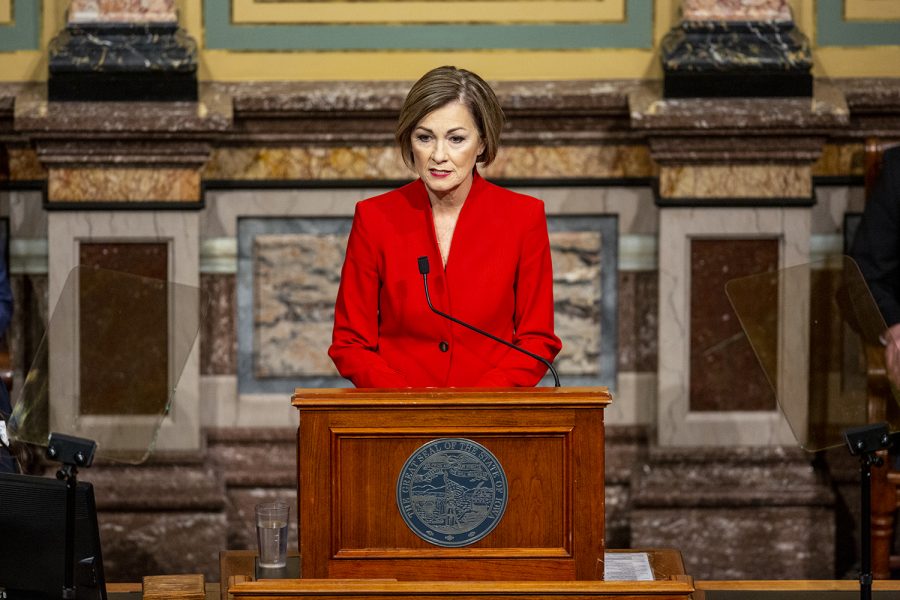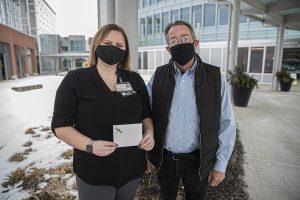Gov. Kim Reynolds announces 16 percent increase in COVID-19 vaccine doses
Gov. Kim Reynolds announced an increase of 6,000 COVID-19 vaccines in a press conference Wednesday.
Gov. Kim Reynolds gives the State of the State address in the house chamber of the Iowa State Capitol on Tuesday, Jan. 12, 2021 in Des Moines. Gov. Reynolds highlighted in the address expansion of broadband internet, a push for in-person learning, and economic recovery from the COVID-19 pandemic.
January 27, 2021
Republican Gov. Kim Reynolds said Wednesday that Iowa will be receiving a 16 percent increase in coronavirus vaccine doses over the next three weeks, and on Feb. 8, Iowa will see an additional 20,000 doses.
Reynolds said the federal government is increasing each state’s vaccine allocations by 16 percent, and in Iowa, that means an additional 6000 doses. This brings the state’s current total to roughly 25,800 doses.
Additionally, Reynolds said the new Johnson and Johnson vaccine will receive emergency use authorization next month, speeding up the vaccination process
There is no shortage of providers ready to administer the vaccine, Reynolds said. Iowa opted into a federal public-private partnership earlier this year with CVS and Walgreens, which provides states with healthcare workers to help administer the vaccine.
However, there is a question on when enough vaccines will be available.
“Pharmacists are often a community’s most accessible healthcare provider. And many of them have been preparing for and meeting regularly with local public health officials for the past several months to coordinate the nation’s administration plans,” said Lindsay Ludwig from the CPSN Iowa Community Pharmacy Network.
The demand for vaccine production continues to rise while the state’s supply remains low, Ludwig said. She said that pharmacies are keeping their communities as updated and educated as possible, and as vaccine rollout continues, local pharmacies will be an important access point for Iowans to receive their vaccines as quickly and safely as possible.
The Daily Iowan reported Tuesday that leaders at the University of Iowa Hospitals and Clinics say the vaccine supply is low in the state. But, UIHC officials are confident they can maintain a steady flow of vaccine distribution. In the first phase of the vaccine rollout, UIHC could vaccinate about 1,000 people in one day at the same location.
The state is currently in phase 1A of vaccine distribution which includes health-care providers and long-term care residents. All individuals and workers in long-term care facilities are expected to have received their first dose, and some their second dose, by the end of the month, Reynolds said. Following phase 1A is 1B, where first responders and K-12 education staff will be next to receive the vaccine.
Pharmacist in Bremer County Ryan Frerichs said pharmacists in his community as well as across the state are handling the challenge of preparing a plan for an undetermined number of vaccine doses.
“Our staff will adapt and respond to administering the vaccine when they receive it. All Iowans who want to be vaccinated will get vaccinated,” Frerichs said.
Reynolds said that in order to let Iowans feel as though they truly have a choice in the vaccination process, individuals in the workforce will not be forced to disclose whether or not they get the vaccine.
After Reynolds’ appearance in a public relations video for a Utah company that was given no-bid contracts for work on the vaccine, Reynolds responded to allegations of favoritism and preferential treatment.
“If you qualify you qualify, so it’s that simple,” Reynolds said.
Any allegation of preferential treatment is unjustified, Reynolds said, because the pandemic caused processing plants to shut down, so it was critical that food providers and farmers got help they needed.
“We have to take a look at what we can do to keep the food supply chain moving and to keep companies open … so if you called and wanted to try and facilitate a way to get your employees tested so you could ensure them that they were working in a safe environment, that’s what companies were doing,” Reynolds said. “We were doing everything we could to help facilitate that and I will give no apologies for doing that. None.”






